

For a long time now, we’ve been a nation of brands. We have our favorite candy bars, sodas, toothpastes and even TV channels. We watch, use and eat “our” brands and leave the others on the shelf. But few of us realize how many of those items we love are actually owned by the same conglomerate – huge financial institutions that consolidate into their systems one product after another.
And often, what we don’t know can hurt our communities. When a handful of companies own all of the most popular brands that Americans use every day, they hold a privileged monopoly on our lives. Capitalism is supposed to offer choice, but more and more the decision is between one huge marketing scheme and another. Capitalism is supposed to foster consumer democracy, but instead it channels our choices into a few mega-corporations that are enriched by our loyalties.
Take media.


It was a busy time for hard-right politicians visiting the Bay Area this week. First, Kentucky Senator Rand Paul stepped into the lion’s den of Berkeley, where he flashed civil liberties cred by denouncing domestic spying before a University of California audience. He was followed by Texas Governor Rick Perry who, with tax breaks and other incentives, tried to coax some Silicon Valley nabobs into burnishing the “tech” in Texas by relocating there. Although these two Republicans are clearly limbering up for presidential runs in 2016, Perry’s visit got comparatively scant media coverage. One reason may be the perception that Paul, who recently won the Conservative Political Action Conference’s straw poll, is the man on horseback right now while Perry is, well, Rick Perry.
Another reason might be that Perry’s brief visit seemed like a follow-up house call from his widely covered 2013 grand tour, during which he attempted to poach jobs from six states (California,
» Read more about: Rick Perry’s Tall Texas Tales of Job Creation »


The more Miguel Santana forecasts financial apocalypse for Los Angeles, the more the city’s Administrative Officer reminds us of the late Harold Camping, the fundamentalist minister who a few years back predicted the end of the world – erroneously, it turned out, much to the chagrin of disciples who had quit jobs and given away wealth and possessions as they awaited the Rapture.
In a new report issued yesterday by his office, Santana warned L.A.’s leaders against the “temptation” to expand city services, much less think of adding any new ones. And pay raises for city workers? Forget about those. Indeed, Santana recommends cutting entry-level salaries for city workers and raising the health care costs of municipal employees. The reasoning behind Santana’s report is that despite the economic recovery, Los Angeles isn’t out of the woods yet and should only party like it’s 2009 – Year Zero of the Great Recession.
» Read more about: Miguel Santana: Apocalypse Now! (Or Next Year) »
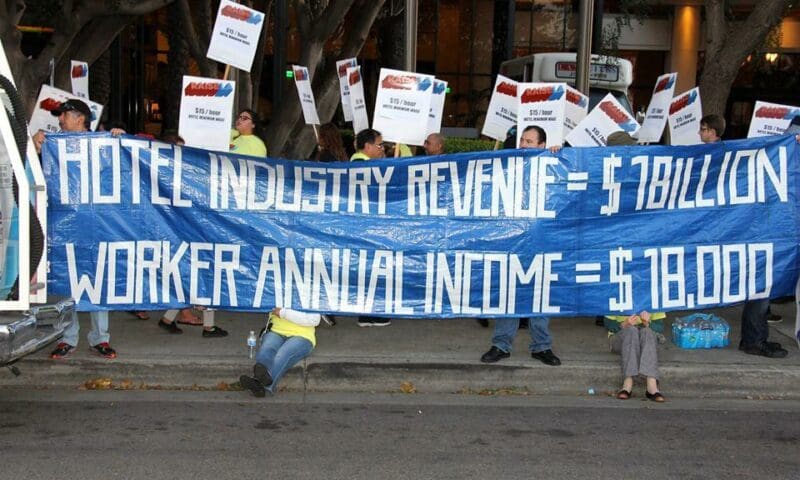
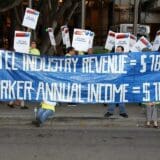
Last week the L.A. Times ran an editorial about the city’s proposed hotel worker minimum wage policy. Given past history—the Times has opposed every local living wage proposal over the past 17 years—it’s natural to see progress in a piece that acknowledges that “persistent poverty” is a “fundamental challenge” and argues that “Creating policies that help lift people out of poverty should be one of government’s top priorities.”
Many have read the Times’ editorial as a call for a broader policy covering more workers, which is a kind of backward endorsement of the Raise LA proposal. In the end, however, the Times stays true to its track record, opposing a $15 minimum wage not only for hotel workers but effectively for others as well.
The point is evident at the bottom of its piece, where the editorial board suggests (without evidence) that raising wages to this level may harm business,
» Read more about: L.A. Times’ Double Talk on Raising Wages »


Thirteen years ago Barbara Ehrenreich’s Nickel and Dimed touched off a debate that still rages about the difficulty of low-wage earners – particularly women – to earn a living that merely provides for the basics of existence, let alone its creature comforts. This week the documentary film Paycheck to Paycheck: The Life and Times of Katrina Gilbert continues that debate as it tracks single mother Katrina Gilbert over the course of a year as she tries to pay rent and put food on the table while navigating Tennessee’s social service and health care bureaucracies. If anything, Gilbert’s harrowing story shows how little things have changed for the working- and near-poor since Nickel and Dimed.
One of 42 million American women living on the edge of poverty, Gilbert is a nurse’s aide earning $9.49 an hour in Chattanooga without health care benefits. She suffers from a hyperthyroid condition and is seen deciding which of her many prescriptions she can afford to buy – while also struggling to finish a college education that could lift her living standard beyond the trailer she shares with her three young children.


Beatriz Rios-Nava, 57, has been driving trucks for 10 years. Since starting with a company at the port in Long Beach, she has passed the long hours of waiting in shipping yard queues by taking phone-camera snapshots of her environment: her morning coffee and bread nestled on the dashboard of her truck, her co-workers picketing for unionization outside of their company. Her growing collection of images documenting her life on the piers of Long Beach will be showcased in Solitude to Solidarity, a weeklong group exhibit that runs for the next week. (See information at the end of interview.) I spoke with her at her home in Compton, which she moved into three years ago, hoping to settle somewhere closer to her work. We sat on a black leather sofa in her living room, beneath a hanging dreamcatcher, as she attempted to calm her dog Picasso, who was excitedly bouncing between us.
» Read more about: Beatriz Rios-Nava’s Truck-Driving Odyssey »


There was nothing ordinary about David Koff. Yet Koff – the premier documentarian of L.A.’s epic immigrant worker movement of the 1990s and early 2000s – dedicated much of his life to telling the stories of the dispossessed and voiceless, from Southland hotel housekeepers to Africa’s legions of urban poor.
Koff, who died last week at the age of 74, was a striking figure in every respect, from his long ponytail and immaculately groomed white beard to his singular speaking voice and keen intellect. An Oscar-nominated filmmaker in the first part of his career, he became a legendary labor researcher, media strategist and videographer whose work both captured and helped catalyze the remarkable ascent of L.A. hotel workers as major players in the city’s political transformation.
I first met Koff in the late `90s while working on a state investigation into the Belmont Learning Center, a controversial $200 million project that crumbled under the weight of its own colossal mismanagement – and the brilliant PR work of Koff,
» Read more about: The Cinemagician: Activist Filmmaker David Koff »


I started working at UNITE HERE Local 11 back in 1997. I’ve stayed a part of the labor movement for nearly two decades in no small part because of David Koff, then a researcher with the union, who died last week at age 74.
David was an intellectual and an activist of a kind that’s all too rare these days. He was funny and incredibly smart, and spent the first 30 years of his adult life supporting and making movies about radical international causes.
He took work seriously and was passionate about it, talked too much and made fun of himself. He called our strategy group the Popular Front Organizing Committee and was only half joking. He vowed not to cut his hair till he won a campaign and didn’t. He did construction with a friend of his, doing great work and somehow always alienating everyone by showing up late or not at all.


Lawmakers in Iowa, Maryland Oregon and Washington advanced legislation to rein in reckless outsourcing of public services to for-profit corporations and private entities. Meanwhile, Minnesota is the latest state to introduce legislation that would keep taxpayers in control of their services by increasing transparency and accountability, bringing the total number of states to 16. And locally, Douglass County, Kansas, passed some of the toughest taxpayer protections against predatory outsourcing in the nation.
“American taxpayers are tired of getting ripped off by corporations that take control of public services and rake in massive profits by cutting corners to public health and safety,” said Donald Cohen, executive director of In the Public Interest Action Fund. “There is a sea change happening and taxpayers are leading the charge.”
In Iowa, SF 2235 passed the full Iowa Senate. SF 2235 would give Iowa taxpayers more power to cancel contracts if for-profit corporations fail to meet performance standards.
» Read more about: States, Counties Move Against Outsourcing »


Who says debating the need for a living wage is like talking to a brick wall? The recent experience of one health care provider and its employees shows how respectful and reasonable such discussions can be.
Tomorrow (Thursday, March 13), a pivotal agreement between labor and management will be announced that offers hope for the living wage movement. St. John’s Well Child and Family Center, a nonprofit network of community health centers, and Service Employees International Union (SEIU) 721 will unveil a new collective bargaining agreement that will result in the centers’ front-line health care employees receiving a $15 hourly living wage. The contract was unanimously ratified by rank and file members March 3.
St. John’s provides health services at 10 centers and clinics throughout Central and South Los Angeles. Its president and CEO, Jim Mangia, issued a statement that said, in part, “We put forward the proposal for a living wage because we want our health centers to be the best places to give and to receive care.
» Read more about: Health Care Network Signs Living Wage Pact with Union »


It is a sign of how far right the Republican Party has moved that New York Times columnist Ross Douthat describes Rep. Paul Ryan as a “moderate.”
In his column on Sunday, “Four Factions, No Favorite,” Douthat looked at the likely candidates for the 2016 Republican presidential nomination. Drawing on an article by Henry Olsen in the conservative journal National Interest, Douthat divides the GOP core voters into four groups: centrist (“think John McCain’s 2000 supporters or Jon Huntsman’s rather smaller 2012 support”), moderately conservative (“think the typical Mitt Romney or Bob Dole voter”), socially conservative (“think Mike Huckabee or Rick Santorum backers”) and very conservative but more secular (“think Gingrich voters last time or Steve Forbes voters much further back”).
Reviewing the stellar cast of likely GOP wannabes for 2016 (Chris Christie, Ted Cruz, Scott Walker, Jeb Bush,


The conventional wisdom of capitalism is encapsulated in the phrase “trickle down.” This means the money that some very rich people have accumulated gets invested in ways that create jobs, and the money dribbles down the social pyramid, first to administrators, then white collar managers and bureaucrats, then to the assembly line or shop floor workers, then to the janitors. General Motors used to be the quintessential capitalist corporation. “What was good for General Motors,” it was believed during the Eisenhower years, “was good for the country.”
Then in the 1980s, an economist from USC sold Ronald Reagan on a re-constructed version of this model. He called it “supply side economics.” This notion claims that the more goods are available for people to buy, the more money will concentrate in the upper reaches of the rich, and somehow, this is good for the country. The Walton family heirs to the Walmart fortune are a good example of this business model.
» Read more about: Trickle Down Profits Don’t Raise Any Boats »


If you’ve ever had to remodel or make major repairs on your home, then you know hiring the right contractor and constant oversight is key to a job well done. After all, if anything goes wrong, it is your time, money, and home at risk.
The Newark Star-Ledger covered a new study by Rutgers University that illustrates exactly this point with government contracts. According to Overlooking Oversight: A Lack of Oversight in the Garden State is Placing New Jersey Residents and Assets at Risk, contracts in the Garden State are often executed without adequate oversight or with poor contract language lacking high performance standards and accountability.
This is a big deal because unlike home renovation contractors that affect our porches, government contractors affect services that profoundly shape people’s lives—lives such as the victims of Hurricane Sandy.
» Read more about: Jersey Study: Subcontracting for Trouble »
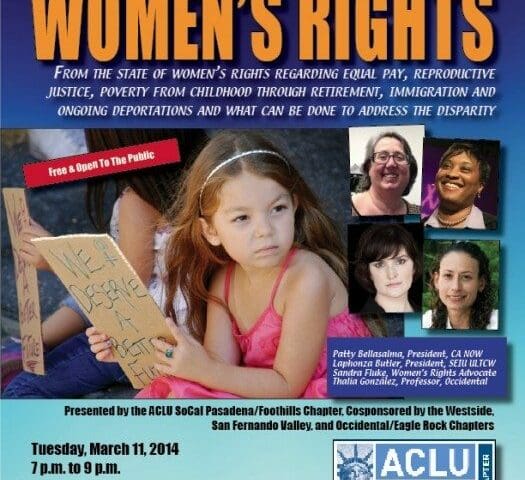

Tuesday’s bimonthly SoCal ACLU discussion forum will address the topic of women’s rights. Organized by the ACLU’s Pasadena/Foothills chapter, the event promises to be a much larger event than usual, prompting the chapter’s Sharon Kyle to announce its move to a bigger venue. Discussion topics will focus on women’s economic, political, social and legal rights, said Kyle, who publishes LA Progressive. Four guest speakers include the California president of the National Organization for Women, Patty Bellasalma; Service Employees International Union United Long Term Care Workers president Laphonza Butler; attorney and activist Sandra Fluke (who so angered Rush Limbaugh two years back), and Occidental College professor Thalia González.
Kyle, who says that she and other black women haven’t always felt connected to the women’s movement, thinks this particular topic is ready for revisiting. For Kyle, the intersection of race and gender is central to the Women’s Rights Forum.
» Read more about: Laphonza Butler, Sandra Fluke Speak at Women’s Forum »


You may have heard that American Airlines is ending its policy of offering bereavement fares for passengers seeking last-minute tickets to attend family funerals. The announcement passed as do most news stories about the downsizing of American generosity – with a nostalgic whimper and corporate waiver. When CNN asked American Airlines the reason for the change, the company hid behind US Airways, the no-frills step-sister with which it had recently merged.
“In order to have a single, consistent program for American and US Airways,” read a canned statement, “we will adopt the US Airways policy and now offer customers the option to purchase changeable and refundable fares.”
In other words: US Airways made us do it! CNN didn’t ask American why it didn’t do the opposite and make US Airways adopt American Airline’s bereavement policy. Perhaps after more than a decade of beating contract concessions and givebacks from its unions,
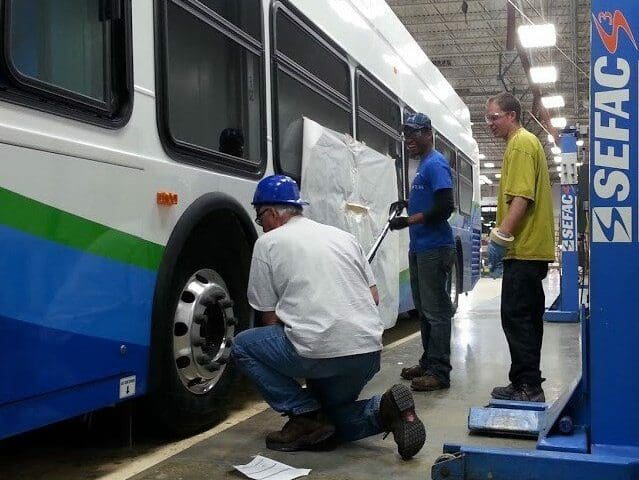

Minnesota is cold. When I visited the state in early February, surprisingly, the subzero temperatures weren’t the only reason for this impression. It was actually the sight of 122 acres of mangled metal above the Mississippi River that chilled me to the bone.
In St. Paul, a former Ford factory, which operated for more than 80 years and employed thousands of workers manufacturing cars, is being demolished. Seeing firsthand the historic Twin Cities Assembly Plant’s demise and the loss of so many quality, unionized American manufacturing jobs made me feel a keen sense of grief.
Ironically, I had come to Minnesota to encourage the creation of U.S. manufacturing jobs, by advocating that the Twin Cities regional planning agency, called the Metropolitan Council, leverage its purchases of buses and trains. I represented the Jobs to Move America coalition, which unites more than 30 community,
» Read more about: A Manufacturing Pulse Beat in the Heartland »
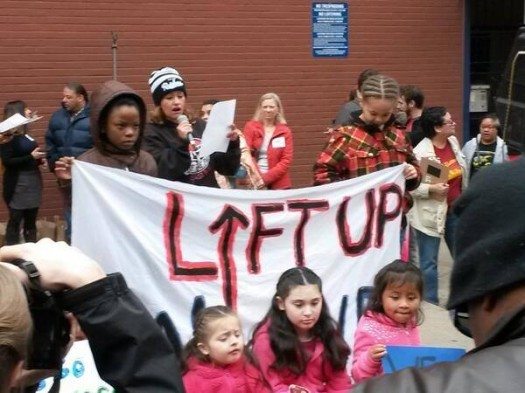

A man wearing the uniform and cap of a fast-food worker, his apron tucked into a pant pocket, approached a clerk at the Alameda County Social Service Agency. As he handed over documents for his public assistance benefits claim, the man explained how it had felt to be waiting in the lobby for the past several hours:
“I was the first here and the last to leave.”
“You should get a pay check!” the clerk responded.
The reality is that this man does “get a paycheck” from his minimum wage job, but finds himself unable to meet his basic needs. This is a common scene at my office in Oakland and public assistance offices across the country.
This month’s National Association of Social Workers’ theme is “All People Matter,” chosen to remind us of our profession’s commitment to improving social conditions for all.
» Read more about: ‘All People Matter’ — It’s Time to Raise the Minimum Wage »
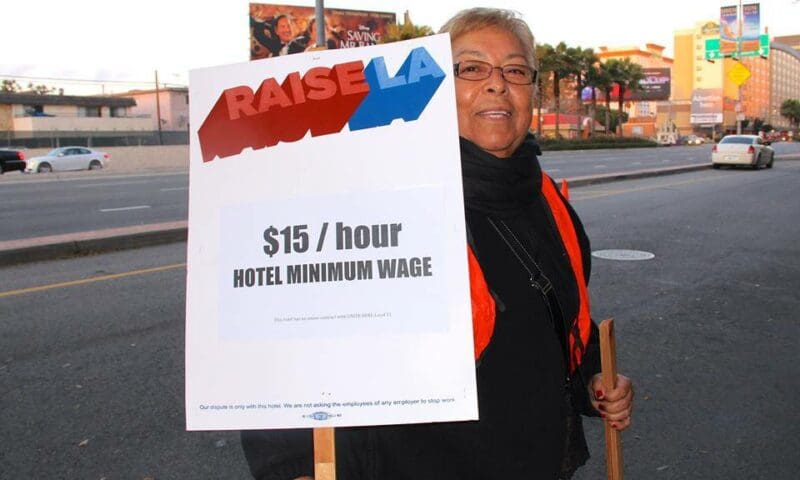
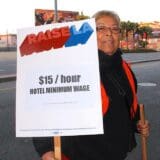
In an economy where constant, unpredictable change is a given, wages are one of the few things that have remained reliably stagnant. However, a growing national movement to address this increasingly visible issue is taking shape. Locally, Raise LA, a coalition of labor and community groups organized by the Los Angeles Alliance for a New Economy (LAANE), is part of a push to bring wages up to speed by advocating for better jobs in L.A.’s massive hospitality industry. According to a LAANE Raise LA report, “Residents, workers and businesses from communities across Los Angeles are united in the Raise LA Coalition in an effort to ensure that the city’s largest and most profitable hotels support the communities in which they operate.”
So why is Raise LA specifically focusing on hotels? One in 10 jobs in Los Angeles County is in the leisure and hospitality industry,
» Read more about: Raise LA Campaign Targets Hospitality Industry’s Low Wages »
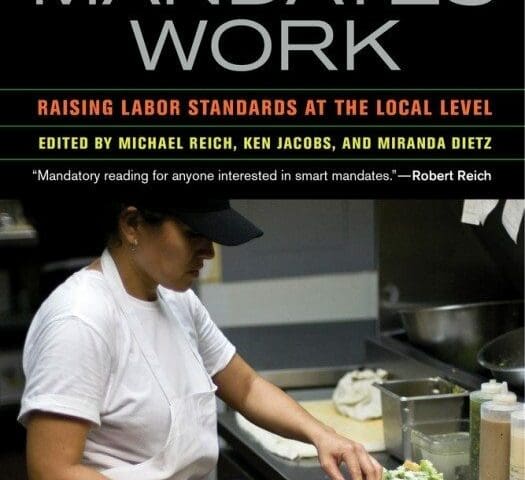
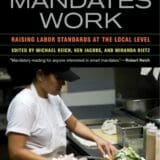
Forget, for the moment, downer news stories coming out of Midwestern statehouses, Southern auto plants and sundry federal courts. A new book edited and co-written by three Bay Area researchers optimistically chronicles what can be accomplished when progressive politicians and a determined electorate, backed by an energetic union movement, tackle income inequality, health care, labor peace and other challenges. When Mandates Work: Raising Labor Standards at the Local Level, edited by Michael Reich, Ken Jacobs and Miranda Dietz, parses a dozen years of legislation passed by San Francisco voters or their board of supervisors. Thanks to 10 ordinances enacted between 1996 and 2008 —
In an interview with Capital &
» Read more about: How San Francisco Created a New Social Compact: An Interview With Ken Jacobs »


After the President’s State of the Union address, federal policy circles are squarely focused on how to speed and grow America’s economic recovery. President Obama was right when he said America needs “a set of concrete, practical proposals to speed up growth, strengthen the middle class and build new ladders of opportunity.”
America’s public transportation infrastructure provides one excellent opportunity to build a more equitable, prosperous economy. Here are five policy prescriptions that can help create good jobs and growth in the transportation sector:
1. Make a globally competitive investment in infrastructure. Increase federal funding to address America’s infrastructure deficits identified by the American Society of Civil Engineers and detailed in the BlueGreen Alliance’s Repair America report, especially in the transportation sector. Investments in transportation can put Americans back to work while rebuilding our crumbling roads and bridges, and improving the efficiency of our rail and transit systems.
» Read more about: Five Policy Prescriptions for Transportation Job Creation and Growth »